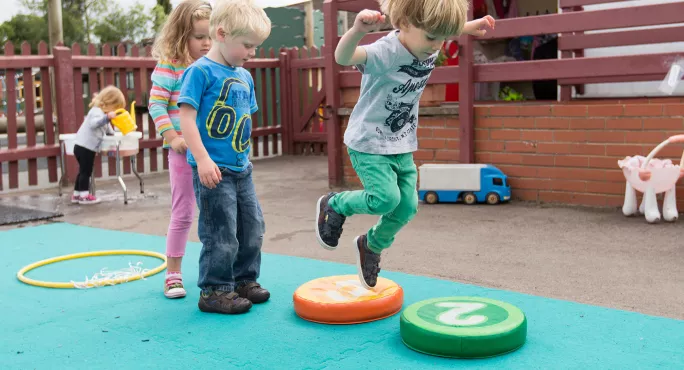- Home
- Proposed new Early Learning Goals - full details
Proposed new Early Learning Goals - full details

New goals setting out what four- and five-year-olds are expected to do will be trialled in 25 schools this September, the Department for Education announced today.
The proposals are expected to ease the burden of the moderation process and enable teachers to “make a rounded judgement about a child’s development”.
The Early Learning Goals (ELGs) for children at the expected level of development being piloted include the following:
Communication and Language
Listening
- Listen carefully and respond appropriately when being read to and during whole-class and small group discussions;
- Make comments about what they have heard and ask questions to clarify their understanding;
- Hold conversation when engaged in back-and-forth exchanges with their teachers and peers.
Speaking
- Participate in small group, class and one-to-one discussions, offering their own ideas, using new vocabulary;
- Offer explanations for why things might happen, making use of new vocabulary from stories, non-fiction, rhymes and poems when appropriate;
- Express their ideas using full sentences, with modelling and support from their teacher.
Physical Development
Gross Motor Skills
- Negotiate space and obstacles safely, with consideration for themselves and others;
- Demonstrate strength, balance and coordination;
- Move energetically, such as running, jumping, dancing, hopping, skipping and climbing.
Fine Motor Skills
- Hold a pencil comfortably using the tripod grip;
- Use a range of small tools, including scissors, paintbrushes and cutlery;
- Show accuracy and care when drawing and copying
Personal, Social and Emotional Development
Self-Regulation
- Show an understanding of their own feelings and those of others, and regulate their behaviour accordingly;
- Have a positive sense of self and show resilience and perseverance in the face of challenge;
- Pay attention to their teacher and follow multi-step instructions.
Managing Self
- Manage their own basic hygiene and personal needs, including dressing and going to the toilet;
- Understand the importance of healthy food choices;
- Explain the reasons for rules and know right from wrong.
Building Relationships:
- Work and play cooperatively and take turns with others;
- Form positive attachments and friendships;
- Show sensitivities to others’ needs.
Literacy
Comprehension
- Demonstrate understanding of what they have read and has been read to them by retelling stories and narratives using their own words and new vocabulary;
- Anticipate - where appropriate - key events in stories, non-fiction, rhymes and poems;
- Use new vocabulary during discussions about stories, non-fiction, rhymes and poems and during role-play.
Word Reading
- Say a sound for each letter in the alphabet and at least 10 digraphs;
- Read words consistent with their phonic knowledge by sound-blending;
- Read aloud simple sentences and books that are consistent with their phonic knowledge, including common exception words.
Writing
- Write recognisable letters, most of which are correctly formed;
- Spell words by identifying sounds in them and representing the sounds with a letter or letters;
- Write simple phrases and sentences that can be read by others.
Mathematics
Number
- Have an understanding of number to 10, linking names of numbers, numerals, their value, and their position in the counting order;
- Subitise (recognise quantities without counting) up to 5;
- Automatically recall number bonds for numbers 0-5 and for 10, including corresponding partitioning facts.
Numerical Patterns
- Automatically recall double facts up to 5+5;
- Compare sets of objects up to 10 in different contexts, considering size and difference;
- Explore patterns of numbers within numbers up to 10, including evens and odds.
Understanding of the World
Past and Present
- Talk about the lives of the people around them and their roles in society; know some similarities and differences between things in the past and now, drawing on their experiences and what has been read in class;
- Recall some important narratives, characters and figures from the past encountered in books read in class.
People, Culture and Communities Children
- Describe their immediate environment using knowledge from observation, discussion, stories, non-fiction texts and maps;
- Know some similarities and differences between different religious and cultural communities in this country, drawing on their experiences and what has been read in class;
- Explain some similarities and differences between life in this country and life in other countries, drawing on knowledge from stories, non-fiction texts and - when appropriate - maps.
The Natural World Children
- Explore the natural world around them, making observations and drawing pictures of animals and plants;
- Know some similarities and differences between the natural world around them and contrasting environments, drawing on their experiences and what has been read in class;
- Understand the effect of the changing seasons on the natural world around them.
Expressive Arts and Design
Creating with Materials
- Draw and paint using a range of materials, tools and techniques, experimenting with colour, design, texture, form and function;
- Share their creations, explaining the process they have used;
- Make use of props and materials when role-playing characters in narratives and stories.
Performing Children
- Sing a range of well-known nursery rhymes and songs;
- Perform songs, rhymes, poems and stories with others, and - when appropriate - move in time with music;
- Co-construct, invent, adapt and recount narratives and stories with peers and their teacher.
Keep reading for just £1 per month
You've reached your limit of free articles this month. Subscribe for £1 per month for three months and get:
- Unlimited access to all Tes magazine content
- Exclusive subscriber-only stories
- Award-winning email newsletters



